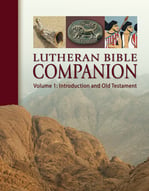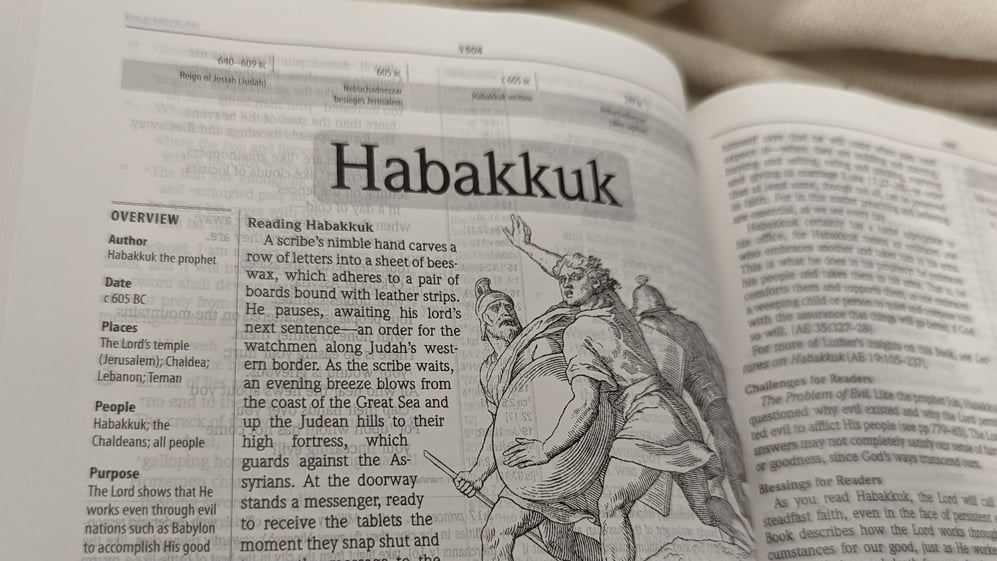Why does God allow bad things to happen to those who love Him? Habakkuk cries out to God and asks Him why He continuously allows the righteous to be persecuted by the wicked. In this book, Habakkuk records God’s response to the faithful. The following has been adapted from Lutheran Bible Companion.
Purpose/Recipients
The prophet opened the book with a complaint against God. But the ultimate target of Habakkuk’s message was the people of Judah and Jerusalem who would face the Babylonian threat (cf “Chaldeans” in 1:6). Habakkuk is unique among the Prophetic Books of the Old Testament in that he never directly addressed God’s people, who would read his message. Yet, by making his message plain (2:2), he enabled people to understand who the Lord is and what He will be doing for them (v 20).
Characters
Who is the subject of the laments, and/or against whom are the woes of Hab 2 directed? Conversely, who are the righteous in 1:2–4, 13? Are the same people in view in all instances, or different ones? Are the evils spoken of internal (Judah’s) or external (some foreign oppressor)? Habakkuk gives no specific historical references, and in the light of other prophets, the moral concerns could apply to Gentile nations as well as to Israel (or to both). Just about every empire in the history of the Near East from Assyria on has been suggested as playing a role.
Certainly in the broader canonical context, and perhaps quite specifically, the prophet’s aim is all ungodliness, whenever it manifested itself.
Specific Law Themes
The major issue in Habakkuk centers around the problem of evil. In many respects, this prophet echoes the Book of Job or certain psalms when he asks the age-old question: Why do You permit evildoers to flourish, allowing them to oppress the righteous? (1:13). This is a question to which there are only partial answers. The Lord seems silent in response to the injustices and sufferings of His people, who can only wait.
Excessive love of wine (or wealth) besets the arrogant; this reckless bravado led to their downfall (2:5). The wealth the Chaldeans had accumulated from the nations they oppressed would be plundered by the survivors of those very nations (2:7–8). Habakkuk ridicules idols as a product of human imagination. Silent and dead, the idols are able to teach no one (2:19). Those intoxicated with pride most often deal treacherously with others and are themselves in danger of destruction (Pr 16:18).
Specific Gospel Themes
Habakkuk is told to wait and attend his own life (2:3). He is to live by faith that God will eliminate evil in His own proper time. Waiting for the Lord is an act of faith and hope (Ps 33:20–22). In contrast to the arrogant person, the one who lives by faith is righteous, trusting in God’s promises while waiting for the Lord to act (Hab 2:4).
The message of the Book of Habakkuk can well be summarized in God’s statement of promise: “the righteous shall live by his faith” (2:4), and the prophet’s statement of faith, “I will rejoice in the LORD; I will take joy in the God of my salvation” (3:18). The book is a source of continuing encouragement for all who live by faith and wait for the Lord’s final return and the end of all evil.
Specific Doctrines
The problem of the book is the problem of evil—in world history, in the Church, in the human heart—the realization that every human “solution” contains the seed of its own dissolution and often only exacerbates the problems.
God’s answer is primarily to trust, to have faith that God will work all things for good (cf Rm 8:28). The posture of the faithful supplicant, then, will always be one of waiting. There finally is no other answer to the problem of evil but the answer of faith.
The Lord’s answer to Habakkuk in 2:4, “the righteous shall live by his faith,” had monumental impact upon the Church’s teaching twice in history. First, it shaped the teaching of early Christians in contrast to legalism, as shown by the number of times Hab 2:4 is referenced in the New Testament. Second, this passage played a similar role during the Protestant Reformation, which directed the Church’s teaching back to the New Testament emphasis of justification by
God’s grace through faith. As a result, Habakkuk’s little book still profoundly affects the Church’s doctrine and focus. Luther wrote, “Here we see that the prophets preached and stressed faith in the Christ as much as we do in the New Testament; here we see that Habakkuk is so bold as to condemn all other works and attribute life exclusively to faith. For he states plainly enough that the unbeliever will succeed in nothing. Let him pray and wear himself and work himself to death. His works already stand condemned as counting for nothing at all; nor will they help him. And the believer shall live by faith without works” (AE 19:197).
Blog post adapted from Lutheran Bible Companion, vol. 1: Introduction and Old Testament, pages 949–55, © 2014. Concordia Publishing House. All rights reserved.
Scripture: ESV®.
Quotations marked AE is from Luther’s Works, American Edition (82 vols.; St. Louis: Concordia Publishing House and Philadelphia: Fortress Press, 1955–).
 To read more about Habakkuk, read Lutheran Bible Companion.
To read more about Habakkuk, read Lutheran Bible Companion.











